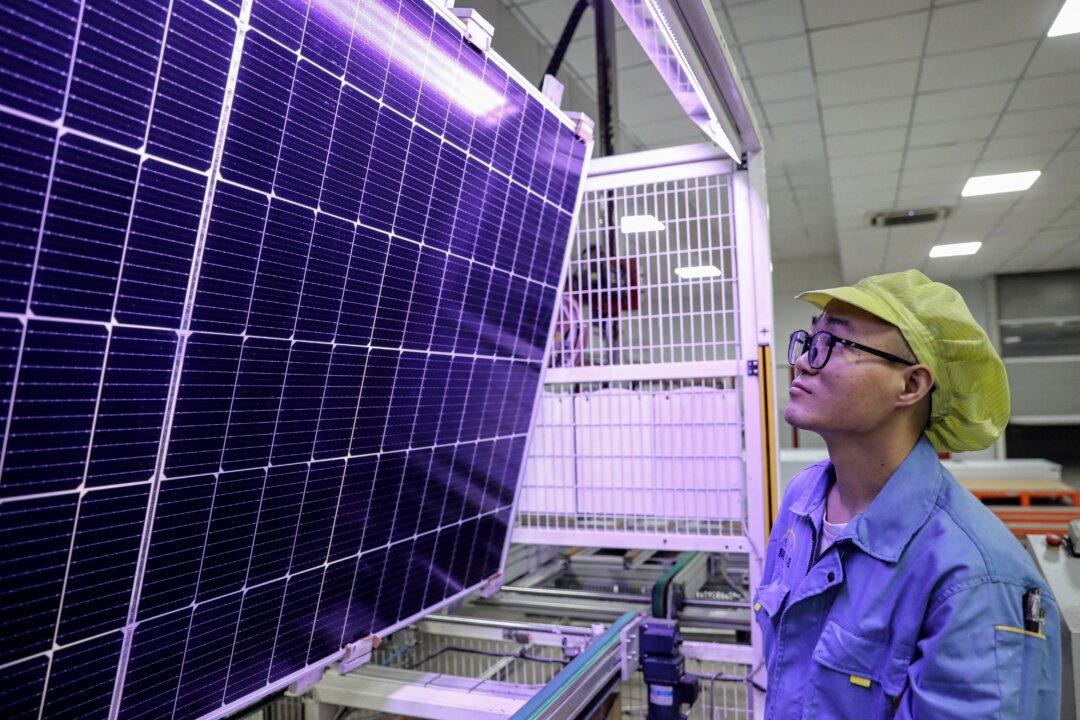As the Biden administration rolled out new sanctions against China’s communist regime for what it calls “unfair trade practices,” protections were also announced specifically for the United States’ growing solar industry.
Those protections, announced on May 15, come as President Joe Biden looks to promote his “Investing in America” agenda, continue the clean energy transition in the United States, and define his position toward the Chinese Communist Party (CCP) during another presidential race against former President Donald Trump.
The protections include a crackdown on solar imports from Asia, improvements to current tax credits, and the allocation of millions of dollars in additional funding.
President Biden raised tariffs on solar cells and modules from 25 percent to 50 percent and removed a previously enforced exemption on bifacial solar modules used in utility-scale solar projects. His administration is also considering increasing the current 5-gigawatt tariff rate on imported solar cells to 7.5 gigawatts to ensure that domestic manufacturing continues to grow.
The Biden administration also announced that it would end a 24-month “bridge” that made certain imports from Southeast Asian countries such as Cambodia, Thailand, Malaysia, and Vietnam duty-free. The bridge was established, according to the administration’s press release, to “ensure robust deployment while the domestic solar manufacturing base ramped up.” The Department of Commerce and the Department of Energy will also be monitoring imports from those countries to ensure the U.S. market does not become “oversaturated.” U.S. Customs and Border Protection will also be put to work to prevent the stockpiling of duty-free imports.
Meanwhile, the Department of Energy is providing more than $70 million toward solar supply chain research and development through the Bipartisan Infrastructure Law. This funding follows the $7 billion in Solar for All competition grants awarded by the Environmental Protection Agency through the Greenhouse Gas Reduction Fund, created by the Inflation Reduction Act, and the $4 billion provided by the Department of Energy through 48C Advanced Energy Projects credits.
Those projects include Georgia-based SOLARCYCLE, Inc., which received $64 million for solar glass production.
Regarding taxes, the administration announced changes to the bonus tax credit provided by the Inflation Reduction Act, which provides a 10 percent domestic content bonus and a 30 percent credit for renewable energy facilities.
The IRS requires that 40 percent of such a project’s manufactured products be made in the United States, and clean energy developers can now rely on the Department of Energy’s default cost percentages to determine their eligibility for a bonus. The IRS is also considering expanding this tax credit to include other clean energy sectors, such as offshore wind.
“These actions will provide a boost to domestic solar producers, but the impact of Chinese oversupply on U.S. investments in the solar market remains a challenging issue,” John Podesta, President Biden’s senior adviser for international climate policy, said on a call with reporters.
When President Biden and U.S. Trade Representative Katherine Tai announced the tariffs, they emphasized the unfairness created by the CCP’s subsidizing of these industries.
When asked during a May 14 press briefing to describe the difference between the U.S. government’s subsidizing efforts and those of the CCP, particularly with the electric vehicle industry, Ms. Tai said the Chinese subsidies are aimed at “cornering the world market and achieving dominance and creating dependency.”
“The types of support that we’re talking about here are defensive in nature,” she said. “They’re about creating the space to compete, the space to thrive, the space to survive the kind of onslaught that we are seeing across the board.”





